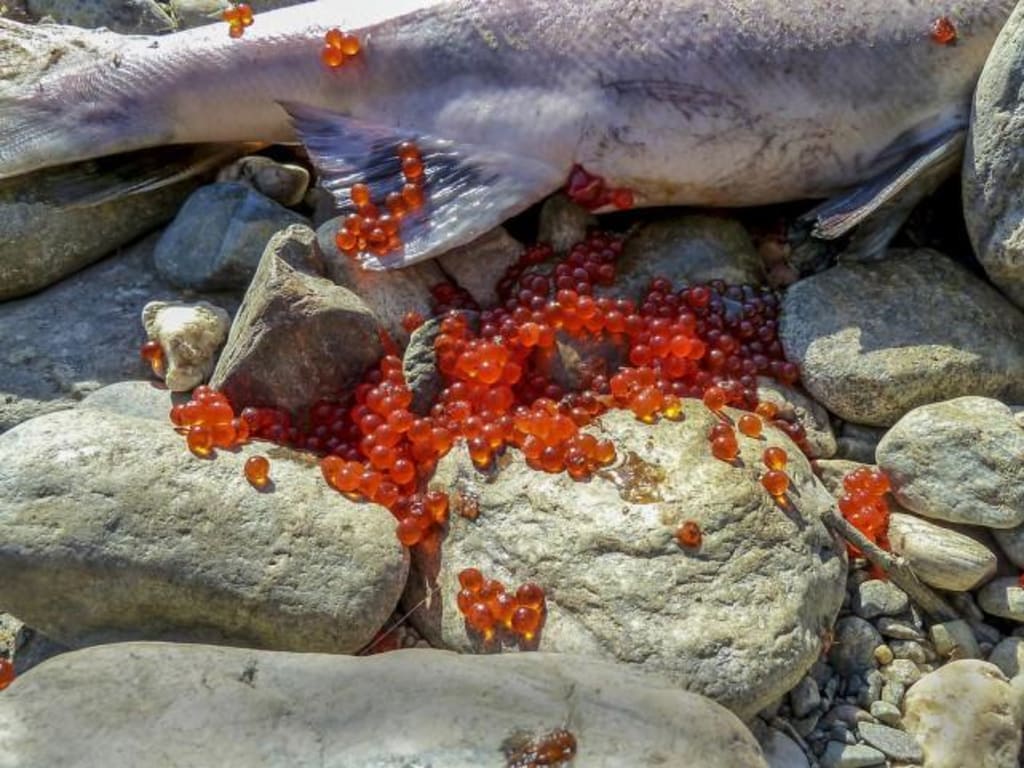Strange, many small fish appeared out of thin air in the open-air bucket that the woman filled with sand! Where did the fish come from?
tenacious fish eggs

Recently, a woman in Guangdong purchased some sand for the renovation of her home. When the renovation was over and some of the sand was not used up, she put the remaining sand in a bucket and put it outside the house in the open air, no longer paying attention.
However, a month later, when the woman checked the bucket again, something interesting happened. There was a certain amount of water in the bucket in the open air, and many small fry were swimming in the water.
According to the woman, she did not know how the fish came from or what species they were, and now she would take some rice to feed the small fish every day.
This is indeed very interesting and strange. How can a bucket that had no water, but was only used to hold sand, suddenly grow so many small fish?
The sand used for construction basically comes from the river
There are many different natural sands on earth, including desert, marine, and riverine, which are obtained either through weathering or scouring by water.
However, for construction sand, it basically can only use the sand in the river. The sand produced by river scouring meets the requirements of construction in terms of surface roughness, particle size, and salinity.
If the woman in Guangdong used river sand for decoration, the first possibility of fish appearing out of thin air in the bucket is that the fish eggs were laid at the bottom of the river bed, and then fished out together with the sand and transferred to the woman's hands .
Due to the high amount of rain in Guangdong, the fish hatched when the temperature was just right after the water in the bucket slowly filled up.
But can fish eggs really be preserved and transferred like this?
tenacious fish eggs
For most fish, as long as the spawning is over, they basically ignore it and let the eggs fend for themselves.
It seems to us that the parents of the fish are not very responsible, but in fact this is only because most fish adopt another survival strategy - they lay more and stronger eggs as a hedge against the high mortality of their offspring Rate.
In order to ensure that the eggs can hatch, the eggs of almost all fish are the same, they are very powerful, even stronger than their parents, such as the alligator gar, which is very hot these days, their eggs are even poisonous.
The fact that many fish eggs are poisonous is an effective defense, but for those fish that live in freshwater waters, in addition to some defenses, they need to consider how to deal with the possibility of drying up at any time riverbeds, and how to spread themselves in completely isolated waters.
In many places, there is a saying that "thousand years of grass seeds, ten thousand years of fish roes", which means that the seeds of grass can be stored for a long time, but the fish eggs can be stored for a longer time than the grass seeds, which is used to describe the tenaciousness of fish eggs. .
In fact, there is a big exaggeration in this statement. It is difficult for fish eggs to remain longer than grass seeds. Most fish eggs are difficult to survive for too long without water.
However, with the exception of some fishes, which have evolved under conditions of alternating periods of prolonged drought and drought, the eggs of these fish can be retained for a long time in drought conditions, and some African pseudogillfish even need to experience drought for several months. Only then can they hatch, and those with this characteristic are basically freshwater fish.
The sand of this lady from Guangdong may have been kept wet during use, or the eggs themselves could have survived in dry conditions. In short, it is entirely possible that there are fish eggs in the construction sand and fish suddenly grow. .
Do freshwater fish spread themselves through eggs?
If you look around carefully, you will find an isolated body of water that has suddenly appeared and is not connected to any river. There may be a few fish swimming in it, and even the stagnant water in the fields due to continuous rain may appear.
Intrigued as early as the 19th century as to why such isolated and sudden bodies of water contained fish, evolutionary gurus, including Darwin and Wallace, agreed that fish eggs were transmitted by birds. .
They believe that fish eggs all have a certain stickiness. When birds prey or perform other activities in the water, the eggs are easily attached to the legs of the birds, and then follow the birds to spread to other water bodies, including those isolated Water body.
However, no one has really seen fish eggs spread like this, so there is doubt here.
One truly proven method of roe transmission is that as the eggs pass through the digestive tract of birds, they are expelled like plant seeds, sometimes landing right on the body of water and hatching small fish.
In 2020, researchers at Hungary's Danube Institute for Ecological Research Center fed eight captive mallards with fertilized eggs from two invasive fish species, carp and Prussian carp.
Each mallard got about 500 eggs, and six ducks excreted a total of 18 well-preserved eggs in their feces, 12 of which contained live embryos.
However, the study also noted that nine of the live embryos died from subsequent fungal infections, and only three successfully hatched small fish, including one small carp and two small Prussian carp.
A total of only three eggs hatched successfully, which does not look like a lot, but considering the ovulation ability of fish—for carp, 1.5 million eggs can be released at a time, so the hatching ratio is already high.
The study, published in the journal Proceedings of the National Academy of Sciences in June 2020 [1], is a good example of how fish can be transmitted through bird droppings.
However, this is just one way that fish spread to isolated bodies of water, and there are many potential transmission methods, including fish eggs sticking to the legs of birds, and amphibians and mollusks may be potential spreaders.
So, the fish appeared out of thin air in the bucket of this lady in Guangdong, and there may be a second story, that is, a bird was playing in the bucket, and it happened to be carrying fish eggs, and as a result, the fish was spread.
at last
There is a popular comment below this news feed. He said that he once dug a well in his hometown. One year his dad found a lot of shells while cleaning the well. He didn't say that he let it go.
In fact, the most important tool for fish dissemination now is people - artificially putting some fish into some isolated water bodies, but those who have not seen the fish fry on the spot will think that the fish appear out of thin air.
Therefore, there is a third possibility in the bucket of this lady from Guangdong, that is, someone kept fish in it.
About the Creator
tannie rusty
little science knowledge






Comments
There are no comments for this story
Be the first to respond and start the conversation.